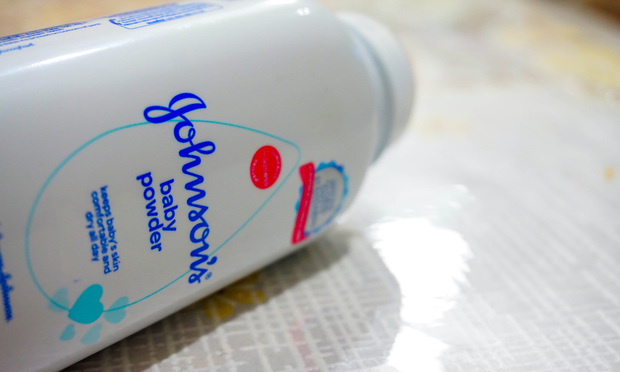J&J Loses Bid to Send Talc Case, Set for First Phila. Trial, to Federal Court
U.S. District Judge Mark Kearney of the Eastern District of Pennsylvania on Tuesday remanded the case to the Philadelphia Court of Common Pleas, denying arguments from the pharmaceutical giant that the case needed to be sent to bankruptcy court in Delaware.
June 12, 2019 at 12:51 PM
4 minute read
 Photo: Shutterstock
Photo: Shutterstock
A federal judge has rejected Johnson & Johnson's efforts to remove to federal court a lawsuit that is set to be the first talc-related case to come before a Philadelphia jury.
U.S. District Judge Mark Kearney of the Eastern District of Pennsylvania on Tuesday remanded the case Kleiner v. Rite Aid to the Philadelphia Court of Common Pleas, denying arguments from the pharmaceutical giant that the case needed to be sent to bankruptcy court in Delaware.
J&J, which has been slammed with verdicts as high as $4.7 billion over its talc products, had argued that indemnifications and shared insurance it has with its talc supplier, Imerys, meant that thousands of talc cases needed to be handled in federal bankruptcy court because, earlier this year, Imerys filed for bankruptcy.
Kearney, however, in a 14-page opinion, agreed with the plaintiff, Ellen Kleiner, that her case linking talcum powder to her ovarian cancer was not sufficiently “related to” the pending bankruptcy, since any indemnification enforcement would need to be pursued through separate litigation.
“Johnson & Johnson emphasizes the initial sentences of the indemnification clauses providing for indemnification. But it fails to account for the glaring qualifications of those obligations,” Kearney said, noting language in their agreements that say Imerys does not need to indemnify J&J for liabilities arising from its own acts or omissions. “This qualified language does not evince the parties' intent to extend automatic indemnity where Johnson & Johnson's own acts or omissions are the subject of litigation. … [I]ts claim can only be vindicated through a second lawsuit.”
Kleiner is being represented by Nancy Winkler and Todd Schoenhaus from Eisenberg, Rothweiler, Winkler, Eisenberg, & Jeck, as well as Ted Meadows of Beasley Allen. In an emailed statement, Winkler noted previous attempts by J&J to remove the case to federal court, and said that, with this ruling, there should be no more delays.
“We are so pleased that Mrs. Kleiner will be able to move forward to trial before a jury in the Philadelphia Court of Common Pleas and obtain justice,” Winkler said. “We hope that other judges in the Eastern District and across the country follow Judge Kearney and numerous other judges who have remanded cases, and remand the cases of these brave women to state court so their cases can be tried without delay.”
A message to J&J's press office was not immediately returned Wednesday morning.
Kleiner's case is one of 2,400 lawsuits from across the country that J&J removed to federal court in April, citing the Chapter 11 bankruptcy that Imerys Talc America filed in February. Imerys is J&J's exclusive supplier of talc.
In its efforts to remove the cases to federal courts, J&J pointed to the federal bankruptcy statute, which, J&J said, gives the Delaware federal court the authority to determine the proper venue for civil claims “related to” Imerys' bankruptcy. Because its contracts with Imerys contained indemnifications and the supplier also sought to claim J&J's insurance for expenses incurred in defending the talc cases, the entire talc litigation, J&J contended, should be considered “related to” bankruptcy, since Imerys' pool of available assets could also be affected.
Plaintiffs successfully pushed back against defense bids to remove the cases.
In his opinion, Kearney said U.S. District Judge Arthur Schwab of the Western District of Pennsylvania recently granted a similar motion to remand to state court.
“Johnson & Johnson has not shown our 'related-to' jurisdiction over the Kleiners' long pending product liability case set for trial in January 2020,” Kearney said.
This content has been archived. It is available through our partners, LexisNexis® and Bloomberg Law.
To view this content, please continue to their sites.
Not a Lexis Subscriber?
Subscribe Now
Not a Bloomberg Law Subscriber?
Subscribe Now
NOT FOR REPRINT
© 2025 ALM Global, LLC, All Rights Reserved. Request academic re-use from www.copyright.com. All other uses, submit a request to [email protected]. For more information visit Asset & Logo Licensing.
You Might Like
View All
Plaintiff Argues Jury's $22M Punitive Damages Finding Undermines J&J's Talc Trial Win
4 minute read
'Discordant Dots': Why Phila. Zantac Judge Rejected Bid for His Recusal
3 minute read
Pittsburgh Jury Tries to Award $22M Against J&J in Talc Case Despite Handing Up Defense Verdict
4 minute read
Plaintiffs Seek Redo of First Trial Over Medical Device Plant's Emissions
4 minute readTrending Stories
- 1We the People?
- 2New York-Based Skadden Team Joins White & Case Group in Mexico City for Citigroup Demerger
- 3No Two Wildfires Alike: Lawyers Take Different Legal Strategies in California
- 4Poop-Themed Dog Toy OK as Parody, but Still Tarnished Jack Daniel’s Brand, Court Says
- 5Meet the New President of NY's Association of Trial Court Jurists
Who Got The Work
J. Brugh Lower of Gibbons has entered an appearance for industrial equipment supplier Devco Corporation in a pending trademark infringement lawsuit. The suit, accusing the defendant of selling knock-off Graco products, was filed Dec. 18 in New Jersey District Court by Rivkin Radler on behalf of Graco Inc. and Graco Minnesota. The case, assigned to U.S. District Judge Zahid N. Quraishi, is 3:24-cv-11294, Graco Inc. et al v. Devco Corporation.
Who Got The Work
Rebecca Maller-Stein and Kent A. Yalowitz of Arnold & Porter Kaye Scholer have entered their appearances for Hanaco Venture Capital and its executives, Lior Prosor and David Frankel, in a pending securities lawsuit. The action, filed on Dec. 24 in New York Southern District Court by Zell, Aron & Co. on behalf of Goldeneye Advisors, accuses the defendants of negligently and fraudulently managing the plaintiff's $1 million investment. The case, assigned to U.S. District Judge Vernon S. Broderick, is 1:24-cv-09918, Goldeneye Advisors, LLC v. Hanaco Venture Capital, Ltd. et al.
Who Got The Work
Attorneys from A&O Shearman has stepped in as defense counsel for Toronto-Dominion Bank and other defendants in a pending securities class action. The suit, filed Dec. 11 in New York Southern District Court by Bleichmar Fonti & Auld, accuses the defendants of concealing the bank's 'pervasive' deficiencies in regards to its compliance with the Bank Secrecy Act and the quality of its anti-money laundering controls. The case, assigned to U.S. District Judge Arun Subramanian, is 1:24-cv-09445, Gonzalez v. The Toronto-Dominion Bank et al.
Who Got The Work
Crown Castle International, a Pennsylvania company providing shared communications infrastructure, has turned to Luke D. Wolf of Gordon Rees Scully Mansukhani to fend off a pending breach-of-contract lawsuit. The court action, filed Nov. 25 in Michigan Eastern District Court by Hooper Hathaway PC on behalf of The Town Residences LLC, accuses Crown Castle of failing to transfer approximately $30,000 in utility payments from T-Mobile in breach of a roof-top lease and assignment agreement. The case, assigned to U.S. District Judge Susan K. Declercq, is 2:24-cv-13131, The Town Residences LLC v. T-Mobile US, Inc. et al.
Who Got The Work
Wilfred P. Coronato and Daniel M. Schwartz of McCarter & English have stepped in as defense counsel to Electrolux Home Products Inc. in a pending product liability lawsuit. The court action, filed Nov. 26 in New York Eastern District Court by Poulos Lopiccolo PC and Nagel Rice LLP on behalf of David Stern, alleges that the defendant's refrigerators’ drawers and shelving repeatedly break and fall apart within months after purchase. The case, assigned to U.S. District Judge Joan M. Azrack, is 2:24-cv-08204, Stern v. Electrolux Home Products, Inc.
Featured Firms
Law Offices of Gary Martin Hays & Associates, P.C.
(470) 294-1674
Law Offices of Mark E. Salomone
(857) 444-6468
Smith & Hassler
(713) 739-1250





